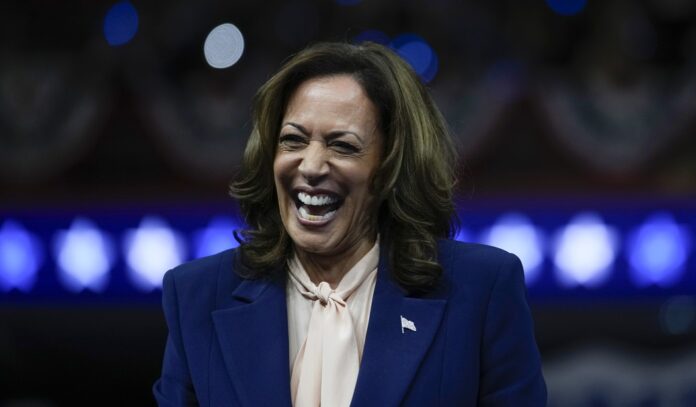On Wednesday, in an exclusive New York Post story, scribe Josh Christenson presented another revelation of shenanigans courtesy of Hunter Biden’s laptop. These revelations involve the passing back and forth of campaign email lists, particularly between the 2015-2016 campaign apparatuses of Kamala Harris and Beau Biden. It’s a bit convoluted, but we’ll try to unpack it all.
Allies of Joe Biden were skeptical that Kamala Harris was “ready” for the national spotlight during her 2016 US Senate campaign — but were apparently happy to hand over donor lists and even offer her a board seat with the Beau Biden Foundation after her camp dangled a $1,000 contribution, emails on first son Hunter Biden’s abandoned laptop show.
If completed, the convoluted transaction flouted the Foundation’s tax-exempt status and may have violated federal election law, experts told The Post this week.
Allies of Harris, then California’s attorney general, contacted Josh Alcorn, Beau Biden’s top political and fundraising adviser, with an unusual request in late 2015 — months after the former Delaware attorney general died of brain cancer.
One would think any request aimed at the “top political and fundraising adviser” to a dead man to be a tad unusual in and of itself, but it seems the Harris campaign was seeking lists of donor email addresses. And they were willing to pay for those lists, which is interesting because that sets a market value for said list.
“Just an FYI – Kamala Harris’s campaign reached out. They’d like to pay us about $1,000 for access to the email list,” Alcorn wrote in a December 30 email to Hunter and Hallie Biden, Beau’s widow.
The money would go to the [Beau Biden] campaign, then be transferred to the foundation,” explained Alcorn, who ran the Beau Biden Foundation for the Protection of Children from January 2016 to June 2021, according to his LinkedIn profile.
Now, here’s the onion:
Three former members of the Federal Election Commission (FEC) told The Post that donor list swaps are common and legal among campaigns, as long as each pays fair market rate.
But funneling the Harris payment to the foundation in exchange for the donor list — after the Biden family made clear months earlier that Beau’s campaign funds would be donated to the foundation — would have been a different matter.
“Charitable organizations are not supposed to be involved in transactions with partisan campaign committees,” said Michael Toner, who served as FEC chairman in 2006 and as a commissioner between 2002 and 2007.
See Related: Incredible Video Shows Just How Far the Media and Deep State Went to Lie to Americans About Hunter Laptop
Deep State Exposed: New Congressional Report Shows All the Players Colluding for the 2020 Election
The first layer to peel off here is the status of the Beau Biden “campaign.” The money paid — and sure, a grand isn’t all that much in the grand scheme of things, but the amount doesn’t matter, the law does — the money appears to have been funneled through the campaign and into the Beau Biden Foundation, a 501(c)(3) corporation. Non-profits of this kind are not supposed to be involved in partisan politics, and according to Mr. Christenson, the Beau Biden Foundation, on a Form 990 filing, had denied “…engag(ing) in direct or indirect political campaign activities on behalf of or in opposition to candidates for public office.”
The second layer here is that the Beau Biden Foundation later offered Kamala Harris a seat on their board of directors. That’s an unpaid position, but one that carries some influence, and could also run afoul of election finance law.
Making such contributions in exchange for appointments — such as a board seat — could also “raise more direct bribery questions,” according to Bradley Smith, a 2004 FEC chairman who also served as a commissioner from 2000 to 2005.
The third layer is that the sale of this donor list may represent an illegal corporate contribution to a campaign.
“They’re not charging the fair market value and that’s the way the FEC looks at things like this,” he added, pointing out that there is currently a $2,000 cap on the amount that campaigns can contribute to other campaigns.
“The fair market value of Campaign A’s list, which it gives to Campaign B, is worth $1,000. That is OK because it is still within the $2,000 limit,” von Spakovsky went on. “But assume that the value of Campaign B’s donor list is $4,000. They have just swapped lists. This was an uneven exchange, resulting in Campaign B making a $3,000 contribution to Campaign A, which is illegal because it violates the $2,000 contribution limit.”
If the donor list came from the foundation itself, he said, that would also amount to “an illegal corporate contribution.”
Harris never accepted the position.
All this is complex, yes; not only complex but convoluted. While there is a lot of what looks like shady dealings here, we can count on a couple of things:
- Nobody in the legacy media will ask anyone involved with the Harris campaign to explain any of this.
- The FEC will not investigate or take any action to determine if any campaign finance laws were broken, or to bring charges if they were.
In other words, it’s just another day in the Swamp. While this seems a lot like a deliberate attempt to sidestep the FEC and federal campaign finance law, we can shine a little light on it, but the FEC won’t do anything.
Still: Hunter’s laptop is just a gold mine, isn’t it?




